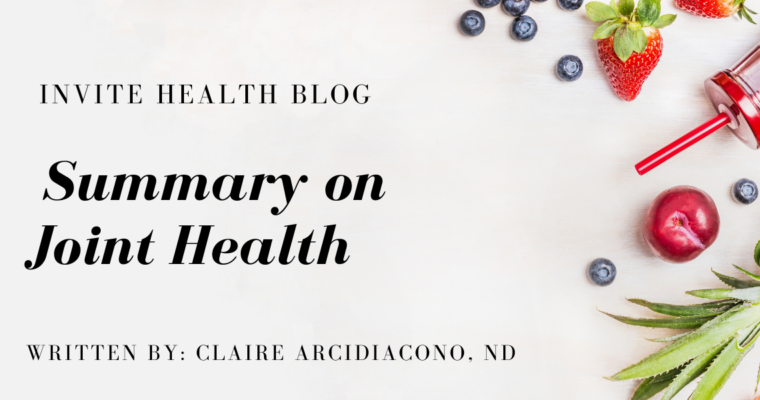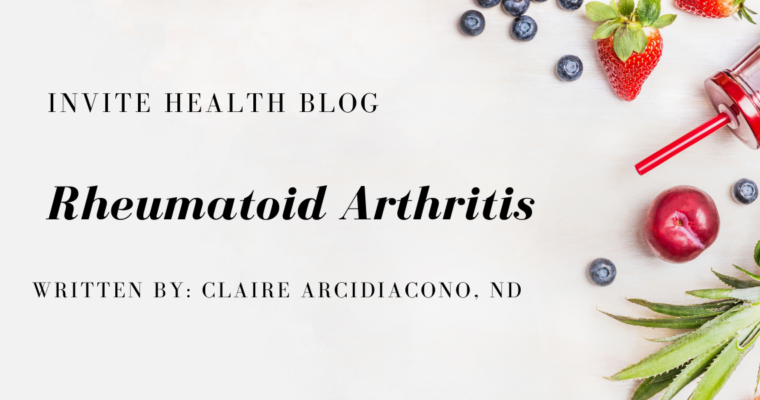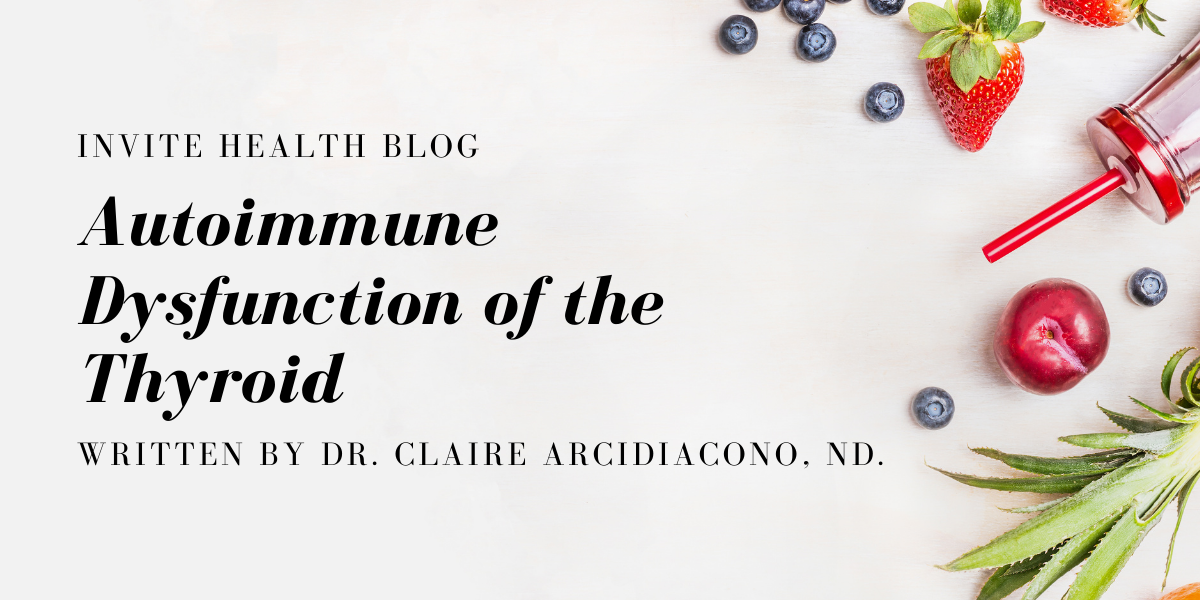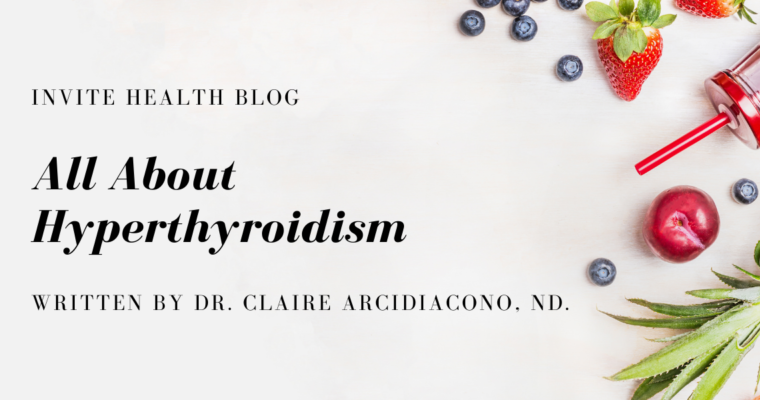thyroid
Written by Dr. Claire Arcidiacono, ND
For further questions or concerns email me at carcidiacono@invitehealth.com
The thyroid is very complex today we will be talking about the autoimmune issues and inflammation of the thyroid!†
What is Autoimmune Dysfunction of the Thyroid?
Autoimmune is a term referring to inflammation in the thyroid usually caused by the body’s immune system attacking the thyroid. The most common autoimmune system disorders of the thyroid are Hashimoto’s thyroiditis, Graves’ disease, postpartum thyroiditis, and silent thyroiditis. Sub-clinical thyroid disorders can be triggered by leaky gut, and other pro-inflammatory situations such as other autoimmune disorders – for example RA/SLE and Diabetes.† (1)
Hashimoto’s disease results in a slow decline of hormones as the cells are damaged by the immune system. The symptoms of Hashimoto’s start slow but proceed to more severe hypothyroidism symptoms as they progress. See my blog on hypothyroidism for a complete list of symptoms! As for blood tests TSH and T3/T4 will be typical for hypothyroidism but what is unique is the presence of specific antibodies called thyroid peroxidase or TPO. Hashimoto’s disease is treated in two main ways. The first is to work with the thyroid to produce more hormones. This is the same way I would treat hypothyroidism (feel free to see my previous blogs!). The second is more about treating the underlying cause. My recommendations for addressing the autoimmune/inflammation will be at the end of this article.† (2)
In contrast to Hashimoto’s, there is Graves’ disease, which results in the overproduction of hormones or in other words the symptoms of hyperthyroidism. For a complete list of symptoms see my blog on hyperthyroidism! Lab results show a typical TSH and T3/T4 for hyperthyroidism as well as antibodies to the thyroid. Radioactive iodine uptake can help determine Graves’ disease. The goal of treatment once again is to work on calming symptoms and work on addressing the underlying inflammation. To work with hyperthyroidism symptoms feel free to consult my blog on this topic! My recommendations for addressing the autoimmune/inflammation will be at the end of this article.† (3)
Postpartum thyroiditis is any thyroid dysfunction that occurs in the first 12 months after pregnancy. This may present as hyperthyroidism type symptoms or hypothyroidism type symptoms or it may present as hyperthyroidism proceeding into hypothyroidism. Postpartum thyroiditis affects approximately 8% of pregnancies. Of those, one in 5 will develop permanent hypothyroidism that needs to be treated. Usual blood work will possibly show antibodies to thyroglobulin, thyroid peroxidase, and TSH receptors. There is usually also a lymphocyte infiltration and T cell changes noted. In the initial phase there is usually a suppressed TSH. As time passes, this can shift to an increase in TSH indicating that there is a shift from hyperthyroid to hypothyroidism. For most women there is no need to treat this condition as hormones will naturally regulate themselves. For others it is important to follow up with a health care provider to address the symptoms of the thyroid dysfunction.† (4)
Silent thyroiditis or sub-acute lymphocytic thyroiditis is considered to be a sub type of Hashimotos which features a goiter. In this condition, there are hyperthyroid symptoms followed by hypothyroidism symptoms. This can be diagnosed by a radioactive iodine uptake because in both hyperthyroid/hypothyroid you will have a decrease in iodine uptake.† (5)
Goiter is a growth in the neck because of an enlarged thyroid, which is usually caused by iodine deficiency. A goiter or even a growth called a thyroid nodule may or may not be metabolically active. If it is active hyperthyroid symptom can occur. If it is not active it can present as hypothyroid symptoms or in many cases they are asymptomatic. Since these growths are most often associated with deficiencies of certain nutrients it is important to include those in any protocol. If they are caused by Hashimotos or Graves’ disease or pituitary disease or thyroiditis it is important to work on this underlying cause. Goiters and nodules are usually not treated independently but rather as part of a protocol to treat something like Graves or Hashimotos. †(6)
Last but not least is sub-clinical thyroid disorders which are usually related to leaky gut and other auto-immune issues such as RA, SLE, and Diabetes. In this situation blood work is normal but is sub-optimum. Treating the symptoms can help with feeling better, but it is very important to work with the underlying issues for example, leaky gut may be addressed by killing bad bacteria or yeast, healing the gut with mucilage herbs and repopulating the flora with probiotics.† (7)
See InviteⓇ Health’s Supplements: Nutristatin 144, Dr. Pressman GI maintain, Colostrum, Min – Acid and Probiotic HxⓇ , Core probiotic and even our Greens HxⓇ . †
Hashimoto’s and Graves’ may have different symptoms that require treatment but working with autoimmune is very similar and studies show that the following Supplements may be helpful:†
Beneficial Supplements for Hashimoto’s or Graves’
Curcumin: Studies show that curcumin has an impact on lowering the eicosanoid pathway which helps to alleviate auto-immune. (8) Other studies show an impact that is directly related to this topic – thyroiditis and Graves and Hashimotos via its ability to regulate inflammatory cytokines.† (9)
See InviteⓇ health’s Supplements: Bio-curcumin 5-Loxin, Dr. Pressman Curcumin blend, Relief HxⓇ, and Dr. Pressman Osteo-lube†
Ginger in studies has been found to reduce pro-inflammatory cytokines thus reducing inflammation.†(10)
See InviteⓇ Health’s Supplements: Turmeric with Ginger for 2 amazing herbs in one†
Omega 3’s have been found to modulate the immune system to lower inflammation and autoimmune.† (11)
See InviteⓇ Health’s Supplements: Fish oil, Krill oil Advanced, High Lignan Flaxseed Complex, Organic Flaxseed Powder and InflamMune HxⓇ†
Probiotics are amazing for regulating the flora in the case of leaky gut as well as modulating the immune system. There are so many studies out there showing the benefits of probiotics!† (11)
See InviteⓇ Health’s Supplements: Probiotic HxⓇ, Dr. Pressman Core probiotic and even our Greens HxⓇ †
Resveratrol is an up and coming nutrient really making a noise! It has been found to be amazing in working with inflammatory conditions. (12)
See InviteⓇ Health’s Supplements: Resveratrol 100mg, Resveratrol HxⓇ and Resveratrol Max HxⓇ †
For Goiters Iodine and Selenium are great to add to the protocol since it is usually deficiencies in these that can cause a goiter to get so large.†(13)
See InviteⓇ Health’s Supplements: Women’s Multivitamin, Men’s Multivitamin, Core Multivitamin, and Performance Multivitamin†
Next week we will be talking about the adrenal glands.
Sources:
https://www.msmc.com/autoimmune-thyroid/#:~:text=The%20most%20common%20forms%20of,an%20overactive%20thyroid%20(hyperthyroidism).
https://www.mayoclinic.org/diseases-conditions/hashimotos-disease/diagnosis-treatment/drc-2035186
https://www.mayoclinic.org/diseases-conditions/graves-disease/diagnosis-treatment/drc-20356245
Keely, Erin Joanne (March 2011). “Postpartum thyroiditis: an autoimmune thyroid disorder which predicts future thyroid health”. Obstetric Medicine. 4 (1): 7–11. doi:10.1258/om.2010.100041. ISSN 1753-495X. PMC 4989649. PMID 27579088.
“Subacute lymphocytic thyroiditis” at Dorland’s Medical Dictionary
Hörmann R (2005). Schilddrüsenkrankheiten Leitfaden für Praxis und Klinik (4., aktualisierte und erw. Aufl ed.). Berlin. pp. 15–37. ISBN 3-936072-27-2.
https://www.healthline.com/health/hypothyroidism/five-natural-remedies-for-hypothyroidism#natural-remedies
https://www.ncbi.nlm.nih.gov/pmc/articles/PMC6566522/
https://pubmed.ncbi.nlm.nih.gov/17569223/
https://pubmed.ncbi.nlm.nih.gov/12480795/#:~:text=Animal%20experiments%20and%20clinical%20intervention,of%20inflammatory%20and%20autoimmune%20diseases.
https://www.frontiersin.org/articles/10.3389/fimmu.2021.578386/full
https://www.hindawi.com/journals/mi/2015/643763/
Hörmann R (2005). Schilddrüsenkrankheiten Leitfaden für Praxis und Klinik (4., aktualisierte und erw. Aufl ed.). Berlin. pp. 15–37. ISBN 3-936072-27-2.







